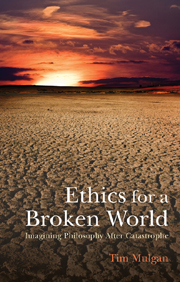Book contents
- Frontmatter
- Contents
- Acknowledgements
- Preface: Imagining a broken world
- Introductory lecture: Philosophy in the age of affluence
- Part I Rights
- Part II Utilitarianism
- Part III The social contract
- Lecture 12 Hobbes and Locke
- Lecture 13 Rawls
- Lecture 14 Rawls and the future
- Lecture 15 Rawls in a broken world
- Part IV Democracy
- Reading list
- Bibliography
- Index
Lecture 12 - Hobbes and Locke
from Part III - The social contract
- Frontmatter
- Contents
- Acknowledgements
- Preface: Imagining a broken world
- Introductory lecture: Philosophy in the age of affluence
- Part I Rights
- Part II Utilitarianism
- Part III The social contract
- Lecture 12 Hobbes and Locke
- Lecture 13 Rawls
- Lecture 14 Rawls and the future
- Lecture 15 Rawls in a broken world
- Part IV Democracy
- Reading list
- Bibliography
- Index
Summary
The main affluent alternative to utilitarianism was the social-contract traditi on, where justice was modelled as a bargain or agreement between rational individuals. Affluent courses in political philosophy often began with two pre-affluent philosophers who both lived three centuries earlier, at a crucial time in the development of affluent political institutions. To understand affluent contract theory, we begin in the same place.
Hobbes
Thomas Hobbes lived through a destructive civil war that caused the deaths of 800,000 people in a population of five million. For Hobbes, civil war was to be avoided at any cost; it not only caused great loss of life, but also made everyone insecure. Hobbes used his experience of civil war to imagine a state of nature. It was a grim place.
During the time men live without a common power to keep them all in awe, they are in that condition which is called war; and such a war, as is of every man, against every man. For war … consisteth not in actual fighting; but in the known disposition thereto, during all the time there is no assurance to the contrary.[…]
- Type
- Chapter
- Information
- Ethics for a Broken WorldImagining Philosophy after Catastrophe, pp. 148 - 159Publisher: Acumen PublishingPrint publication year: 2011



